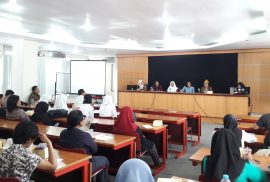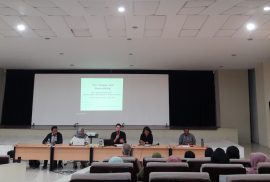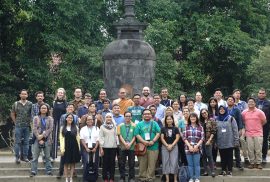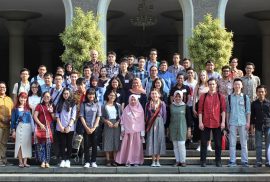‘Memory between generations’ is a point to be discussed in the discussion which took place in the Multimedia Room, Margono Building, 2nd Floor, Faculty of Cultural Sciences UGM. More specifically, the discussion which lasted for 2 hours from 13:00 to 15:00 on Wednesday, August 21, 2019, discussed the memory of the role of women during the revolutionary period. This objective is in accordance with the title given, Dialogue of Three Generations of Women on the Indonesian Revolution. To achieve this goal, three speakers and one keynote speaker, all of whom were women, were invited to participate in this event, namely Mrs. Djuwariyah, Galuh Ambar Sasi, M.A., Shinta Dwi Nugraeni, and Dr. Mutiah Amini.
2019
‘Memori antar generasi’ adalah poin yang ingin dibahas dalam diskusi yang bertempat di Ruang Multimedia, Gedung Margono Lantai 2 Fakultas Ilmu Budaya UGM ini. Lebih khususnya, diskusi yang berlangsung selama 2 jam dari pukul 13:00 hingga 15:00 pada hari Rabu, 21 Agustus 2019 tersebut, membahas memori tentang peran perempuan selama masa revolusi. Tujuan tersebut sesuai dengan tajuk yang diberikan, Dialog Tiga Generasi Perempuan tentang Revolusi Indonesia. Untuk mencapai tujuan ini, tiga orang pembicara dan seorang pembahas yang semuanya perempuan diundang untuk mengisi acara ini, yaitu secara berturut-turut Ibu Djuwariyah, Galuh Ambar Sasi, M.A., Shinta Dwi Nugraeni, dan Dr. Mutiah Amini.
The workshop on Monday, August 19 2019, which was held at the ISI Yogyakarta Postgraduate School was quite different from the usual History Department event. Entitled Hidden Voices: Unpacking the Jaap Kunst’s Collection on the Music of Nusantara, this workshop was held in collaboration between the Department of History, FIB UGM and the Faculty of Performing Arts, ISI Yogyakarta. As the title implies, the purpose of the workshop is to discuss possible areas of research that can be studied about the legacy of a pioneer in modern ethnomusicology studies who made Nusantara music as the object of his study.
Workshop pada Senin, 19 Agustus 2019, yang dilaksanakan di Sekolah Pascasarjana ISI Yogyakarta cukup berbeda dari acara Departemen Sejarah biasanya. Bertajuk Jejak Suara Tersembunyi: Unpacking the Jaap Kunst’s Collection on the Music of Nusantara, workshop ini diadakan atas kerja sama antara Departemen Sejarah FIB UGM dan Fakultas Seni Pertunjukan ISI Yogyakarta. Sesuai dengan judulnya, tujuan dari workshop tersebut adalah membahas kemungkinan bidang penelitian yang bisa dikaji tentang warisan seorang pelopor kajian etnomusikologi modern yang menjadikan musik-musik Nusantara sebagai objek kajiannya.
Being a historian in the period so called as the Industrial Revolution 4.0 – with IT as the main trend, there are certainly many new challenges that must be faced, one of which is Transnational History. Transnational History is not a new thing, but nowdays, transnational become interesting issues to discuss. Placing a local or a national history as part of global history will bring its own appeal, especially for those who have an interest in transnational issues.
On July 22 – August 2, 2019, the Department of History, Faculty of Cultural Sciences, Universitas Gadjah Mada recently held a 2nd International Summer School with the theme “Becoming a Transnational Scholar of Southeast Asia”. This summer school was attended by 35 participants from various countries around the world. The involvement of the participants with different backgrounds has added value to this program. During the program participants can exchange information about history in their country with another perspectives.
Menjadi seorang sejarawan pada periode revolusi industri 4.0 ini – yakni dengan IT sebagai tren utama, tentu ada banyak tantangan baru yang harus dihadapi, salah satunya mengenai Transnasional History. Pandangan mengenai Transnasional History memang bukan merupakan suatu hal yang baru, akan tetapi dengan adanya revolusi industri 4.0, isu-isu transnasional menjadi semakin menarik untuk dibahas. Menempatkan sejarah lokal atau nasional sebagai bagian dari sejarah global, akan memunculkan daya tarik tersendiri, terutama bagi mereka yang mempunyai ketertarikan terhadap isu-isu transnasional.
__________
Course Description
The Department of History, Universitas Gadjah Mada in Yogyakarta plan to continue holding its second year summer school on transnationalism in Southeast Asia following on the successful summer school on transnationalism held at the Faculty of Cultural Sciences, Universitas Gadjah Mada in 2018 with the title “Transnational History: Becoming a Cosmopolitan Historian.” The theme of the second summer school is a broadening of the application of transnationalism in looking not just at historical phenomenon, but present day economic, social, religious, cultural and political phenomenon in the city of Yogyakarta that is rooted in transnational forces and flows. By looking at how transnational flows create emergent potentialities that disrupt regulatory, moral and cultural spaces tethered on notions of fixed spaces and boundaries, the disruptive forces of transnationalism have resulted in categorizing certain people, things, practices and ideas as illegal, illicit, immoral and other pejorative notions; for instances illegal immigrants, drugs or ‘western-customs’. At the same time, other people, things, practices and ideas are considered as legal, legitimate and good. The movement of these groups from one society or country to another has resulted in placing these groups on either side of the legal, licit and moral framework resulting in contestations and reformulation of the framework themselves. These interplay between legal and illegal and moral and immoral thus represent a way in which societies ‘move forward’, by contesting the boundaries and framework of what are considered as good, bad or neutral.
__________
Course Description
The Department of History, Universitas Gadjah Mada in Yogyakarta plan to continue holding its second year summer school on transnationalism in Southeast Asia following on the successful summer school on transnationalism held at the Faculty of Cultural Sciences, Universitas Gadjah Mada in 2018 with the title “Transnational History: Becoming a Cosmopolitan Historian.” The theme of the second summer school is a broadening of the application of transnationalism in looking not just at historical phenomenon, but present day economic, social, religious, cultural and political phenomenon in the city of Yogyakarta that is rooted in transnational forces and flows. By looking at how transnational flows create emergent potentialities that disrupt regulatory, moral and cultural spaces tethered on notions of fixed spaces and boundaries, the disruptive forces of transnationalism have resulted in categorizing certain people, things, practices and ideas as illegal, illicit, immoral and other pejorative notions; for instances illegal immigrants, drugs or ‘western-customs’. At the same time, other people, things, practices and ideas are considered as legal, legitimate and good. The movement of these groups from one society or country to another has resulted in placing these groups on either side of the legal, licit and moral framework resulting in contestations and reformulation of the framework themselves. These interplay between legal and illegal and moral and immoral thus represent a way in which societies ‘move forward’, by contesting the boundaries and framework of what are considered as good, bad or neutral.




